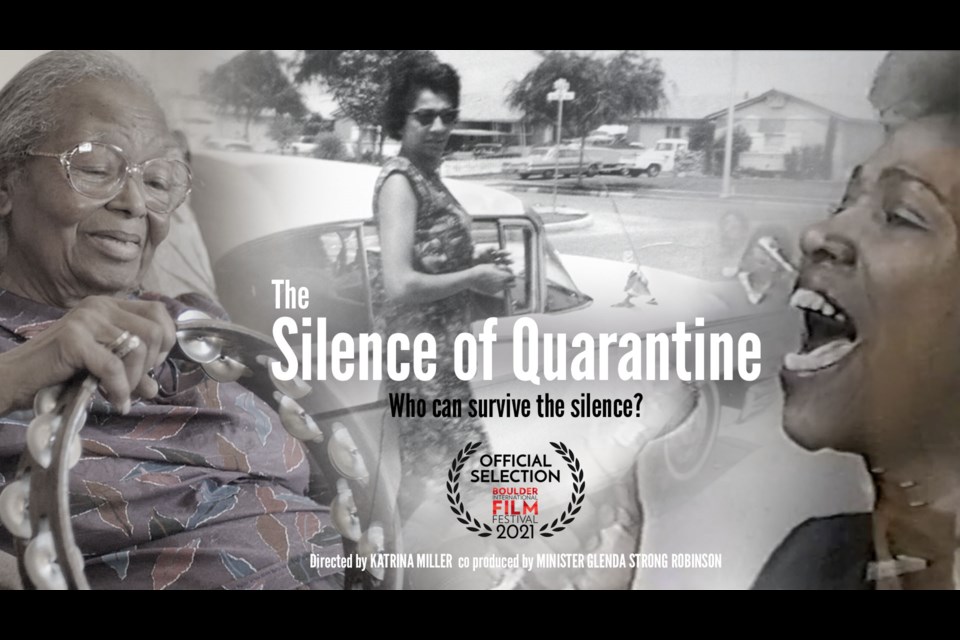Making its premiere at the Boulder International Film Festival, or BIFF, this year is Longmont filmmaker Katrina Miller’s “Silence of Quarantine.” The documentary highlights the lives of two members of Boulder’s Second Baptist Church, the oldest African-American congregation in the area, and the isolation they experienced during the COVID pandemic.
Mrs. Elmira Davis, one of the subjects of the documentary, attended the screening at BIFF, along with Miller and Robinson. During the Q&A portion that followed the film, Davis was met with a standing ovation.
The Saturday morning screening of “Silence of Quarantine” was a part of the “Homegrown Shorts” category. Bookending the short film were the documentaries “Welcome Strangers,” which told the story of Denver’s Casa de Paz and their work to assist asylum seekers released from Aurora, CO’s ICE detention center, and “The Incredible Lamont,” about the life of Boulder stage magician Lamont Ream and his role as caretaker to a disabled relative.
“These types of stories, these local stories, are important to the festival and this international setting,” Miller said. “For BIFF to take on my film has really helped boost it everywhere else, and boost me as a filmmaker.”
"Silence of Quarantine" examines the power of the church as family and community, focusing on the lives of Mrs. Elmira Davis and Mrs. Johnnie Davis (no relation). Both women had been active at Second Baptist Church since the 1960s. Mrs. Elmira Davis helped organize the choir at Second Baptist, while Mrs. Johnnie Davis sang in the choir and helped educate the youth of the congregation. When the pandemic struck, the isolation of quarantine left both women feeling listless and disconnected.
“In the context of ‘Silence of Quarantine,’ I love how it connects people through empathy, through the stories of these people that many can relate to,” Miller said. “There are so many that haven’t been able to go to church, no matter which faith you belong to. There are so many that have lost the elders in their lives or watched them deteriorate.”
Miller met Minister Glenda Strong Robinson through their shared work with the Boulder County NAACP. According to Miller, the Boulder Arts Commission wanted film and art submissions that addressed the impacts of COVID-19 on the area and reached out to the NAACP for more diverse submissions. The NAACP recommended Miller for the film work, and the connection was made.
“Glenda Robinson approached me about making the film,” Miller said. “Right away (Robinson) had this idea to connect me with her church community and the elders there.”
Minister Robinson is a historian, in addition to her role as a faith leader and caretaker in her community. Robinson has lived in Boulder for more than 40 years, chronicling the history of Second Baptist Church and the African-American community. Robinson noted that Second Baptist Church was the only African-American church between Cheyenne, WY and Denver for nearly a hundred years.
A significant aspect of the film is the sense of loss and grief experienced by the community during the pandemic. According to data from the New York Times, there have been more than 600,000 COVID-19 related deaths in the US since the start of the pandemic. Elders over 50 have an increased risk from COVID infection due to health factors, according to the CDC.
Robinson represents the family care ministry at Second Baptist, leading outreach work for the elders at the church.
“We’re a largely senior congregation and we lost almost ten people this past year,” Robinson said. “That’s a lot of people in one year. We’re a community grieving.”
Retired Pastor Emeritus Hansford Vann of Second Baptist passed away in January 2021. Mrs. Johnnie Davis passed away in July 2020, succumbing to long-term illness.
Miller said some of the more interesting responses to the film were from people surprised that the African-American community had a presence in Boulder.
“One of the important aspects of the film is saying ‘here we are,’ and doing it through story,” Miller said. “It isn’t trying to be pushy or preachy, just connecting people through the power of stories.”
Robinson said that one of the reasons she started attending Second Baptist Church after moving to Boulder 40 years ago was to find that sense of camaraderie and community with other African-Americans.In that time she went from sweeping the floors to becoming the second woman to be ordained as a minister in the history of the church.
“I went to Second Baptist Church and realized that it was the only church in the community that had an African-American population, and so I joined,” Robinson said.
According to data from the US Census, as of 2019 only 1.2% of the population for Boulder County are African-American, less than 3,000 people. Robinson recognized that while work is being done in the area to promote greater representation, there is a lot to be done still.
“In a sense if the community is minimized, it is invisible. You find yourself not only wanting to have a voice, but be visible too,” Robinson said. “If we represent 1% of a population of 100,000 people, that’s not a lot of people. You can be invisible anyway.”
Both Miller and Robinson will continue their work serving the community in Boulder County. Miller began working on a feature-length documentary a couple years back, This Is Not Who We Are, and plans to release it before the end of the year. The documentary addresses diversity and inclusion in Boulder, and the experiences of the African-American community within it.
Miller hopes to release “Silence of Quarantine” to a wider audience in the future.



